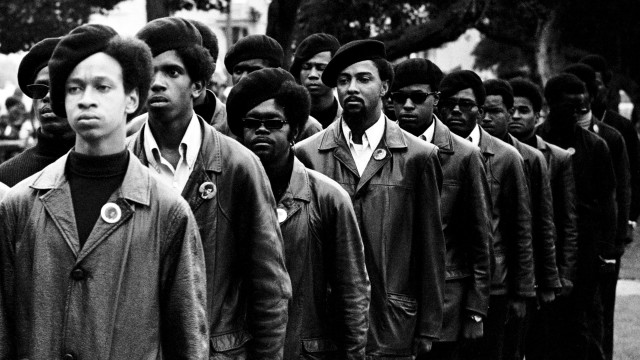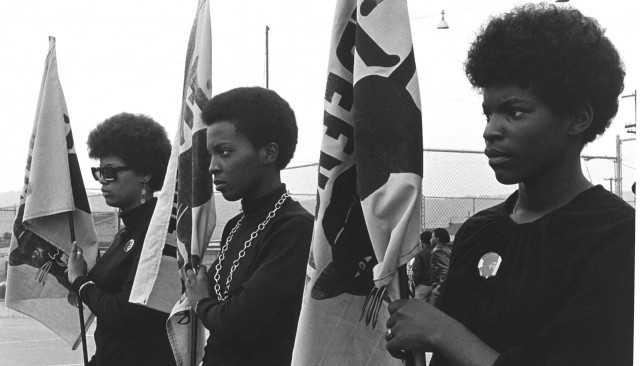THE BLACK PANTHERS: THE VANGUARD OF THE REVOLUTION (Stanley Nelson, 2015)
Film Forum
209 West Houston St.
September 2-15
212-727-8110
filmforum.org
theblackpanthers.com
 At the beginning of The Black Panthers: The Vanguard of the Revolution, Black Panther Ericka Huggins says, “We know the party we were in, and not the entire thing. We were making history, and it wasn’t nice and clean.” Documentarian Stanley Nelson spent seven years making the revelatory film, which details the rise and fall of a group of radical militant African American men and women who decided to fight back against the white establishment and show that black lives matter, almost half a century ago, and no, it isn’t all nice and clean. Nelson (Freedom Riders, The Murder of Emmett Till) combines powerful, rarely seen archival footage with new interviews of the people who were involved in this revolution, which was more complicated than it is often given credit for. The film is sharply one-sided; although a handful of former police officers and FBI agents state their case, their views are given short shrift. “The Panthers were a criminal organization, were violent, and they wanted to kill cops. That’s all I needed to know,” says Ron McCarthy of the LAPD. But Nelson primarily speaks with many surviving members of the party, including Kathleen Cleaver, Elaine Brown, Emory Douglas, Elbert “Big Man” Howard, Jamal Joseph, Flores Forbes, in addition to historians and journalists who put it all in perspective.
At the beginning of The Black Panthers: The Vanguard of the Revolution, Black Panther Ericka Huggins says, “We know the party we were in, and not the entire thing. We were making history, and it wasn’t nice and clean.” Documentarian Stanley Nelson spent seven years making the revelatory film, which details the rise and fall of a group of radical militant African American men and women who decided to fight back against the white establishment and show that black lives matter, almost half a century ago, and no, it isn’t all nice and clean. Nelson (Freedom Riders, The Murder of Emmett Till) combines powerful, rarely seen archival footage with new interviews of the people who were involved in this revolution, which was more complicated than it is often given credit for. The film is sharply one-sided; although a handful of former police officers and FBI agents state their case, their views are given short shrift. “The Panthers were a criminal organization, were violent, and they wanted to kill cops. That’s all I needed to know,” says Ron McCarthy of the LAPD. But Nelson primarily speaks with many surviving members of the party, including Kathleen Cleaver, Elaine Brown, Emory Douglas, Elbert “Big Man” Howard, Jamal Joseph, Flores Forbes, in addition to historians and journalists who put it all in perspective.
Nelson and editor Aljernon Tunsil (Jesse Owens, The Abolitionists) weave together a compelling, and surprising, portrait of the organization, delving into the stories behind such critical personalities as Huey P. Newton, Eldridge Cleaver, David Hilliard, Fred Hampton, and Bobby Seale. The film examines police raids, media coverage, FBI infiltration, trials, and the Panther infighting that ultimately led to their downfall. Perhaps the most frightening images in the film, however, involve the Panthers’ interaction with the police, particularly when coming out of a building with their hands up and their shirts off, trying to prove to the primarily white officers that they are unarmed so they don’t get shot in cold blood. It’s a vivid reminder of some of what’s still happening today around the country while serving as a fascinating companion piece to F. Gary Gray’s Straight Outta Compton; in fact, Nelson employs a potent, funky soundtrack by Tom Phillips along with period songs by Billy Paul, the Chi-Lites, Eugene Blacknell and the New Breed, and Fred Wesley & the J.B.’s. “It is essential to me as a filmmaker to try and give the viewer a sense of what it has meant to be black in America and consider this within our contemporary context,” Nelson explains in his director’s statement. “The legacy of the Black Panther Party had a lasting impact on the way black people think and see ourselves, and it is important that we look at and understand that.” The Black Panthers: The Vanguard of the Revolution does just that, shedding new light on a misunderstood, troubled, and dangerous organization whose legacy can still be felt today. Film Forum is hosting more than a dozen special panel discussions during the film’s run there (September 2-16), with several appearances by Nelson as well as such Black Panthers as Forbes, Joseph, Omar Barbour, Claudia Williams, and Charles “Cappy” Pinderhughes along with journalist Jamilah Lemiux, writer Rita Williams-Garcia, Panther attorney Gerald Lefcourt, and others.

